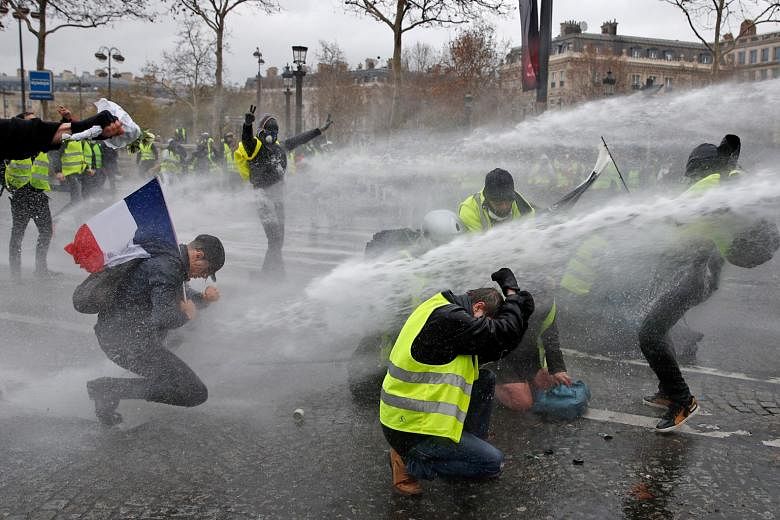PARIS • The single most effective weapon in the fight against climate change is the tax code - imposing costs on those who emit greenhouse gases, economists say.
But as French President Emmanuel Macron learnt over the past three weeks, implementing such taxes can be politically explosive. Yesterday, France delayed for six months a plan to raise already steep taxes on diesel fuel and petrol.
Mr Macron argued that the taxes were needed to curb climate change by weaning motorists off petroleum products, but violent demonstrations in the streets of Paris and other French cities forced him to backtrack - at least for now.
"No tax is worth putting in danger the unity of the nation," said Prime Minister Edouard Philippe, who was trotted out to announce the concession.
It was a setback for the French President, who has been trying to carry the torch of climate action in the wake of the Paris accords of December 2015.
Mr Macron is hardly alone in his frustration. Leaders in the United States, Canada, Australia and elsewhere have found their carbon-pricing efforts running into fierce opposition. But the French reversal was particularly disheartening for climate-policy experts because it came just as delegates from around the world were gathering in Katowice, Poland, for a major conference designed to advance climate measures.
"Like everywhere else, the question in France is how to find a way of combining ecology and equality," said Dr Bruno Cautres, a researcher at the Paris Institute of Political Studies.
"Citizens mostly see punitive public policies when it comes to the environment: taxes, more taxes and more taxes after that. No one has the solution, and we can only see the disaster that's just occurred in France on this question."
In the US in 1993, then President Bill Clinton proposed a tax on the heat content of fuels as part of his first budget. Known as the BTU tax, for British thermal unit, it would have raised US$70 billion over five years while increasing petrol prices no more than 7.5 US cents (10 Singapore cents) a gallon.
But Mr Clinton was forced to retreat in the face of a rebellion in his own party by members who refused to vote for the tax.
To be sure, some climate-conscious countries have adopted carbon taxes, including Chile, Spain, Ukraine, Ireland and nations in Scandinavia. Others have adopted cap-and-trade programmes that effectively put prices on carbon emissions.
Only around 12 per cent of global emissions are covered by pricing programmes such as taxes on the carbon content of fossil fuels or permit trading programmes that put a price on emissions, according to the International Monetary Fund.
Policy experts say that to some extent the prospects of carbon taxes may depend on what happens to the money raised. Using the revenue for deficit reduction, as was planned in France, is a no-no.
"Even in the best of times, carbon taxes must be carefully crafted to avoid political pitfalls," said Mr Paul Bledsoe, a former United States Senate Finance Committee staffer and Clinton White House climate adviser.
"In particular, much of the revenue raised must be recycled back to middle-income workers. Macron's approach put the money towards deficit reduction, stoking already simmering class grievances."
WASHINGTON POST
Q&A
Q Who are the "yellow vests"?
A The movement originated in May when a woman named Ms Priscillia Ludosky, who has an Internet cosmetics business and lives in the suburbs south-east of Paris, started an Internet petition calling for a drop in fuel prices. She broke down the price, noting that taxes made up more than half the cost in France.
In October, truck driver Eric Drouet ran across it and circulated it on Facebook. Newspapers began writing about the petition and the number of signatures skyrocketed from 700 to 200,000. Today, it has more than 1.15 million signatures and counting.
When Mr Drouet decided to hold a car rally-cum-protest on Nov 17 to demand lower fuel prices, word spread on social media. Soon, autonomous groups formed across France and decided to hold their own protests. Early on, people who agreed with the petition were encouraged to show their support by displaying the high-visibility yellow vest every driver in France must by law carry.
Those who participated were predominantly men and women who rely on their cars to get to work and take care of their families. They live and work primarily in rural towns and in the suburbs or exurbs of France's big cities, many earning just enough to get by.
Q How big is the movement?
A Their numbers have diminished since the first gatherings on Nov 17, when nearly 300,000 "yellow vests" protested nationwide. This past weekend, it was 166,000, according to the Interior Ministry.
Q Why are they so angry?
A Many protesters say their purchasing power has dwindled so much over the years that today they have trouble making ends meet. The median earner in 2016 in France took home about €1,700 (S$2,600) a month. Since public transportation is limited in rural France and the suburbs, most of the "yellow vests" have no choice but to use their cars, and are especially sensitive to fuel tax hikes.
Q What do the "yellow vests" want?
A Self-described "moderate yellow vests" wrote an opinion piece on Sunday in French newspaper Le Journal du Dimanche saying a freeze on the planned gas tax increase was a precondition for negotiating with the government. Others have called for President Emmanuel Macron's resignation, and some say Parliament should dissolve itself and hold new elections.
NYTIMES

